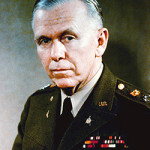 George Catlett Marshall (1880–1959) was a highly decorated American general, statesman, diplomat and military leader. Born into a middle-class family in Pennsylvania, Marshall was educated at a military college before joining the US Army as a second lieutenant in 1902. He served in the Philippines and World War I, and by the outbreak of World War II was US Chief of Staff (1939-45). Marshall resigned his commission after the war but was sent into China by US president Harry Truman, with orders to prevent a civil war between Jiang Jieshi‘s Nationalists and Mao Zedong’s Communists.
George Catlett Marshall (1880–1959) was a highly decorated American general, statesman, diplomat and military leader. Born into a middle-class family in Pennsylvania, Marshall was educated at a military college before joining the US Army as a second lieutenant in 1902. He served in the Philippines and World War I, and by the outbreak of World War II was US Chief of Staff (1939-45). Marshall resigned his commission after the war but was sent into China by US president Harry Truman, with orders to prevent a civil war between Jiang Jieshi‘s Nationalists and Mao Zedong’s Communists.
The so-called ‘Marshall Mission’ (December 1945 to January 1947) aimed to broker an agreement and form a Chinese coalition government (Truman wanted a strong unified China to counter the growing power of the Soviet Union). Marshall formed a three-man committee with Nationalist representative Zhang Qun and communist delegate Zhou Enlai. Negotiations continued for almost two years. While a brief ceasefire was achieved, it could not be sustained and the civil war was resumed. According to Marshall, “the greatest obstacle to peace [in China] has been the complete, almost overwhelming suspicion with which the Chinese Communist Party and the Guomindang regard each other”.
Marshall returned to America and turned his attention to Europe. He was a key sponsor of the 1948 European Recovery Program, an economic aid initiative to assist European reconstruction after the devastation of World War II. This program came to bear his name: the ‘Marshall Plan‘. Marshall became Truman’s Secretary of State in 1947 but retired in 1949 due to ill health. His skills and expertise were sought again in 1950, when America became a key protagonist in the Korean War. Truman appointed Marshall as Secretary of Defense, a position from which he resigned in 1951. Marshall’s contribution to post-war geopolitics has divided opinion. Some hail Marshall as a brilliant administrator while some criticise him for failing to prevent the communist victory in China and America’s involvement in the Korean War.
Information and resources on this page are © Alpha History 2018.
Content on this page may not be copied, republished or redistributed without the express permission of Alpha History. For more information please refer to our Terms of Use.
This website uses pinyin romanisations of Chinese words and names. Please refer to this page for more information.
